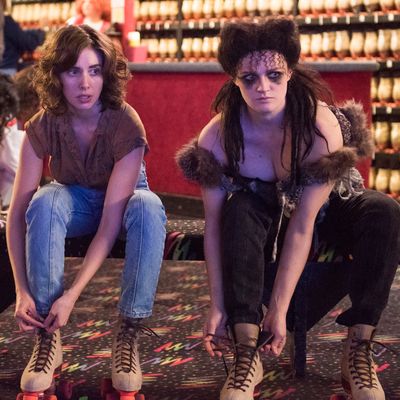
Netflix’s new wrestling comedy GLOW is about women making opportunities where none existed. The key to success, it tells us, is pretending that you don’t know that the patriarchy’s rules exist, the better to ignore them. The pilot starts with its heroine, Ruth Wilder (Alison Brie), at an audition, pretending she doesn’t know she’s reading the man’s part in a scene because the woman’s part is a demeaning waste of time that consists of telling a powerful man his wife is on line two.
It’s a futile protest against the substandard roles she’s been getting recently. She isn’t supposed to pull stunts like that. She’s not supposed to accost the casting director after the audition and complain, either; but her misbehavior leads to a phone call from that same casting director telling her to audition for a project that’s seeking “unconventional women,” so in the end, it all pays off. Ruth is, ironically, one of the more conventional of the unconventional women trying out for Gorgeous Ladies of Wrestling (GLOW), a pro wrestling outfit led by a sexist, chain-smoking, coke-snorting blowhard named Sam (Marc Maron). Her colleagues include a black woman named Tamee (Kia Stevens), an Indian woman named Arthie (Sunita Mani), and a Cambodian woman named Jenny (Ellen Wong), and, eventually, her best friend Debbie Eagan (Betty Gilpin). Debbie had a sorta-successful career on a nighttime soap until she got stereotyped as “difficult” and spent a season in a coma and another season in a wheelchair, then decided to drop out and have a baby rather than keep putting up with the writers’ passive-aggressive cruelty.
What makes GLOW enjoyable (if sometimes imprecise and irksome) is its willingness to mine the same bad and/or stereotypical situations that it’s critiquing for belly laughs. The ’80s, the show never stops reminding us, were a less enlightened time (one wonders what some future Netflix series will make of the one we’re in now), and Sam is an avatar of crassness. He employs outrageously sexist language as he tries to build the wrestlers into a TV-ready source of outrageous excitement (early on, he promises that the women will learn how to execute “cunt punches,” and repeats the phrase again to make sure they heard it) and he plays on racial, ethnic, cultural, and sexual stereotypes when devising the women’s personas. A lot of these are drawn from real-life GLOW characters: Jenny inevitably gets handed a Chinese character named Fortune Cookie, Arthie plays a Lebanese terrorist called Beirut, and Tamee, who has a son at Stanford, performs under the name Welfare Queen.
Ruth and company play along because the demeaning situations that Sam dreams up are at least more unusual than the crap they have to put up with in their regular lives. In time, they figure out ways to subvert the system they’ve found themselves in and carve out more autonomous, or dignified, roles for themselves. Which isn’t to say that the show ever turns into an anachronistic inspiration fest: The women’s triumphs tend to be more personal than systemic. After a certain point, the show becomes a familiar underdog sports story, and series creators Liz Flahive and Carly Mensch never lose sight of the Sisyphean nature of the task at hand.
A good chunk of the action is about how people in all walks of life, not just show business, eventually figure out how to exploit the stereotypes that others use to keep them down, and make money off of peoples’ low expectations of what women are, or what a particular racial or ethnic group supposedly represents. Debbie, a busty blonde whom Sam likens to “Grace Kelly with boobs,” is made the de facto hero of the troupe, while Ruth, a grind who never stops trying to carve out extra privileges for herself, becomes Debbie’s nemesis, a Russian-accented “heel.” (There are anti-Soviet Cold War tensions at play here, too, of course: 1985, the year in which GLOW is set, saw the release of such nuanced portraits of international relations as Rambo II and Rocky IV.) The show isn’t particularly subtle, and most of the time, it isn’t trying to be. Much of its appeal comes from being the sort of broad-strokes comedy of liberation that might’ve been produced in the ’80s — think 9 to 5 or Working Girl, which carried basically feminist messages, but were knowingly retrograde in other ways, and sometimes seemed to be trying to have their cake while eating it, too. The show calls itself out from time to time. “If you’re so into the sisterhood,” one wrestler says to another, “maybe you shouldn’t have fucked your friend’s husband.” “I like the whole ‘please objectify me!’ vibe,” Sam says approvingly of one wrestler.
The series is at its best in smaller, more observation-driven moments, like when Ruth comes home after a long depressing day and casually kills a bug on the wall of her bedroom with a shoe, or when Sam tries to slip between two ropes on the way out of the ring and falls to the ground, lit cigarette still smoldering in his mouth. The series is worth seeing just for Brie’s impersonation of Audrey Hepburn winning an Oscar for Roman Holiday. It’s another part Ruth would never be asked to play, but she kills in it.
*A version of this article appears in the July 10, 2017, issue of New York Magazine.


